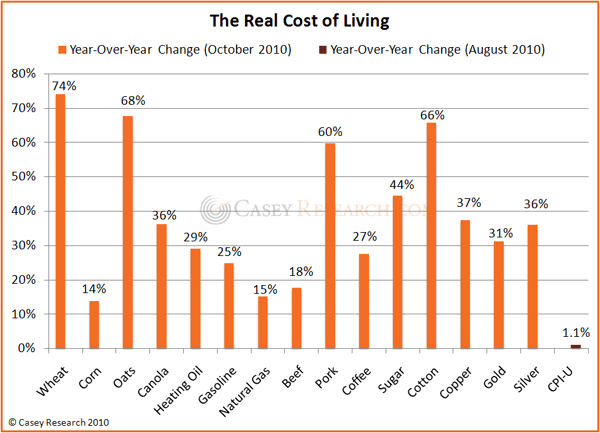The Real Rate of Inflation and How to Protect Yourself
The CPI, or Consumer Price Index, is the official measure of inflation in the
United States. The government utilizes the CPI as a way to make adjustments to
interest rates for things like TIPS (Treasury Inflation Protected Securities) bonds
and entitlement payouts like Social Security. According to the Bureau of Labor
and Statistics, the CPI for the month of August was 1.1%, which means that prices
were up just 1.1% over the previous year. According to Federal Reserve chairman
Ben Bernanke, this is proof positive that there is no inflation to be had, and that we
are, in fact, in a deflationary spiral.
This explains why those purchasing TIPS bonds to preserve their wealth via inflation
protected interest adjustments in recent weeks were actually getting near negative
interest rates - in some cases buying TIPS was an immediate loser in terms of capital
gains. It may also explain why, for two years running, the U.S. government has failed to
make upward adjustments to social security checks.
On its face, viewing the government’s official numbers, the uninformed observer would
assume that inflation really is under control, and that the immediate threat, as touted by
mainstream economist is deflation. This has been used to justify what has been referred
to Quantitative Easing 2, or QE2, leading to ever more money printing by The Fed.
As with all things “official,” however, the CPI lacks appropriate weighting for critical goods -
essential goods - like food and energy.
The following chart from Casey Research shows just how skewed the “official” CPI figures are.
Hint: It’s as big a lie, if not bigger, than the unemployment numbers!

While you may be able to get a great deal on debt-based assets like a house or a car,
it’s obvious that the real cost of living, as measured in critically essential goods like food
and energy, is skyrocketing - just as wages, credit availability and jobs are plummeting.
In April of 2010 we wrote about the possibility of significant food prices increases by 2011,
estimating that at current rates the price of food by April of 2011 may rise 20% - 30%.
Admittedly, we may have been wrong.
It’s may be much worse than we originally anticipated.
If the US dollar continues to be debased by Federal Reserve and Treasury Department
intervention, we can expect hyperinflationary price increases much sooner than we think.
The hyperinflations of the Weimar Republic and Zimbabwe started in similar fashion.
The first few years saw price increases of anywhere from 10% to 35% on foodstuffs.
Within five years however, they were experiencing significant price jumps and overall
instability with their currencies, topping off with inflation rates well above 100,000%
per year. It is a truly terrifying proposition.
What is the best way to protect yourself against such price instability?
Ideally, you’d want to be invested in hard assets - things that will actually be worth something
when paper money is not.
A number of ideas come to mind, and should be able to fit most any budget:
- Gold (physical bullion preferable)
- Silver (physical bullion or 90% junk silver for those on tight budgets)
- Stored dry goods such as wheat, corn, rice, beans, oils & fats, sugar,
- salt, coffee, tobacco
- Tools
- Guns, ammunition
- Skills (developing skills that will be tradeable for other goods is just like
- having cash in your pocket. Can you sew, or grow food, or machine tools, or weld?)
For those who have not yet taken steps to protect themselves against the possibility of
inflation - hyperinflation - take another look at the chart above.
Historically, for the last 100 years, the US dollar has lost over 95% of its value.
Do you think The Fed or US government will implement policies that aim to change this trend?
For more information about hyperinflation and what you can do, we recommend
the following articles:
What is money when the system collapses?
Hyperinflationary Depression - No Way of Avoiding Financial Armageddon
Author: Mac Slavo
Date: October 27th, 2010
Visit the Author's Website: http://www.SHTFplan.com/

Comments